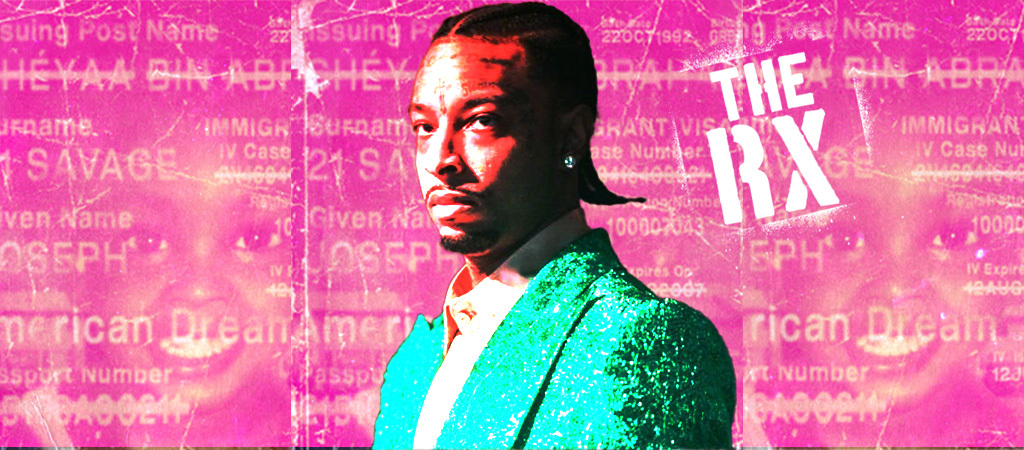The RX is Uproxx Music’s stamp of approval for the best albums, songs, and music stories throughout the year. Inclusion in this category is the highest distinction we can bestow and signals the most important music being released throughout the year. The RX is the music you need, right now.
Like its namesake, 21 Savage‘s new album American Dream is full of glorious contradictions. In one moment, he maintains his fatalistic, sardonic outlook toward the street violence he’s depicted so eloquently throughout his career. In the next, he’s reflective, ruminating on the “Dark Days” following his incarceration for overstaying his childhood visa. There are competently executed love songs alongside groan-inducing fart jokes. In other words, 21 Savage is back like he never left — mostly because he didn’t.
While American Dream is the Atlanta-by-way-of-London rapper’s first full-length solo effort since 2018’s I Am > I Was, he’s kept busy with a string of collaborative projects and EPs that have not only seen him preserve his popularity but also sharpen his skills as a songwriter and as a rapper. The second Savage Mode with Metro Boomin celebrated and built on 21’s newfound notoriety from winning a Grammy with J. Cole in 2019, while Her Loss saw him apprentice himself to Drake, one of the highest-profile artists in hip-hop.
If Drake gave the younger rapper any pointers on securing his longevity in the public eye, he’s certainly put them to use. Where many rappers of his disposition and origin would be content to wear the mask of stony stoicism in the face of both personal and professional setbacks (not to mention, maintaining the image of a cold-eyed trap assassin), 21 has increasingly let his guard down over the past few years, revealing both a goofy sense of humor and a surprisingly sensitive side. His burgeoning vulnerability has endeared him to his audience even more, despite the ostensible incongruity with his music’s subject matter.
It also helps to anchor the ever-broadening array of tools and topics 21 employs on American Dream. While tracks like “Redrum” and “Dangerous” traverse well-worn territory for the lanky Atlantan, they coexist fairly cozily alongside latter-half ballads such as “Prove It” and “Just Like Me” with Burna Boy. 21 sounds equally convincing while threatening to turn “turn bullies to ashes” on “Dangerous” as he does lamenting that “you got accounts, but you don’t hold yourself accountable” over a jealous-but-justifiably-promiscuous lover on “Just Like Me.” (He also deserves some credit for making “accountable” rhyme with “banister” thanks to that peculiar southern drawl.)
It helps when he continues to utilize some of rap’s more engaging production, courtesy of hitmakers like Cardo (“Should’ve Wore A Bonnet”), London On Da Track (“Redrum”), OG Parker (“See The Real”), and of course, Metro Boomin, who contributes five beats. All five of those songs feature standout verses from guest rappers Lil Durk, Young Thug, and even Travis Scott, although the latter still bears an unfortunate lyrical resemblance to his disgraced mentor. The best of the guest spots come from Doja Cat on “N.H.I.E.,” who continues her recent hot streak with added flair — which was possibly inspired by Tierra Whack. Ad-lib!
However, while it’s fun to hear the supposedly remorseless serial killer play around with new sounds and stretch his creative muscles, the hook on “Pop Ur Sh*t” is so bad, you might have to grit your teeth to get to Thug’s verse — then immediately hit “skip.” Meanwhile, thoughtful songs like “Letter To My Brudda” and “Dark Days” almost make you wish that Savage would actually stretch further because he proves so insightful when he exposes his vulnerabilities that his therapeutic observations nearly threaten to undermine the murderous shenanigans.
American Dream could seem like a paradoxical hodgepodge of split personalities, but instead, it becomes a poignant metaphor for the concept of the American dream itself. While 21 Savage’s rags-to-riches narrative practically embodies the idealized, bootstrap-pulling success story that the nation’s leaders love to pat themselves on the backs over, the details reveal the failures and hypocrisies inherent to the system, as well. After all, no one should be forced to drag themselves out of poverty in the first place. That Savage did so while contemplating violence as a mundane fact of life when he could have been doing more all along is so on the nose, it hurts.
American Dream is out now on Slaughter Gang/Epic. You can get it here.







